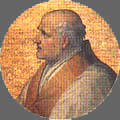 The cruelty of the antipope Boniface did not do him much good.
So great was the indignation against the murderer that Count Sicco, the imperial
agent, was able to overthrow Boniface and the Patrician, Crescentius. This
cleared the way for a new election. Emperor Otto II and his mother, St.
Adelaide, wished Maieul, abbot of Cluny, to take the papal throne.
The cruelty of the antipope Boniface did not do him much good.
So great was the indignation against the murderer that Count Sicco, the imperial
agent, was able to overthrow Boniface and the Patrician, Crescentius. This
cleared the way for a new election. Emperor Otto II and his mother, St.
Adelaide, wished Maieul, abbot of Cluny, to take the papal throne.
But Maieul firmly refused. He felt that it was his duty as it
was his preference to continue to rule the monastic flock entrusted to his care.
Otto then chose Benedict, the bishop of Sutri. Thus Benedict, like his
predecessor and namesake, was a Roman. He was elected pope in October 974. One
of the new pope's first acts was to hold a synod to condemn the antipope
Boniface.
Though Boniface fled to Constantinople, he had a party at Rome
which gave Benedict some trouble. Benedict was able to maintain himself for six
years without much help from the Emperor, who was very busy in Germany. But it
was not easy, and in 980 Pope Benedict was relieved to hear that Otto had
crossed the Alps. The Emperor celebrated the Easter of 981 in Rome and so
overawed the factions that Benedict was able to finish his pontificate in peace.
The Pope held a great council in the presence of Otto, which legislated against
simony. Benedict then addressed an encyclical letter to the Church throughout
the world, publishing the decree against simony. (Simony is the buying or
selling of sacred things.) The Pope added that if any bishop- elect could not
get consecrated without paying money to his metropolitan, he could come to Rome
and be consecrated there. Besides the Emperor, another visitor to Benedict VII
was Hugh Capet, founder of France's great third dynasty. He secured from the
Pope an exemption for a French monastery. Indeed, Benedict was very generous in
the matter of privileges. Many were the German bishops and abbots who obtained
various privileges from this gracious Pope.
It is interesting to note that Benedict consecrated a bishop for
Carthage, a city which had long been under Moslem domination. He also gave the
tonsure to Dunwallon, a Southern Welsh king and was kind to Sergius, archbishop
of Damascus, a refugee from the Saracens. Benedict died probably on July 10,
983. According to his epitaph he was very good to widows and orphans.
Though epitaphs are not the most critical sources, it is not
difficult to believe that Benedict VII was a very charitable pope.
Excerpted from "Popes
Through the Ages" by Joseph Brusher, S.J.

